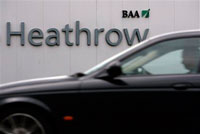Hard landing at Heathrow Airport caused by ice
Ice in fuel lines probably caused a British Airways jet to lose power and make a jarring emergency landing in London in January, investigators said Thursday.

Nineteen people suffered minor injuries when the British Airways Boeing 777 made a crash landing just inside the airport perimeter on Jan. 17.
Investigators from the Air Accident Investigations Branch said that water, which is normally present in aircraft fuel, may have frozen because of unusually cold weather on a flight from Beijing to London on Jan. 17.
"Although the exact mechanism in which the ice has caused the restriction is still unknown in detail, it has been proven that ice could cause a restriction in the fuel feed system," the report said.
"The risk of recurrence needs to be addressed in the short term whilst the investigation continues."
The report called for the Federal Aviation Administration and the European Aviation Safety Agency to work with Boeing and Rolls-Royce, maker of the plane's Trent 800, to develop measures to reduce the risk of ice forming.
The report also recommended that the regulators review certification requirements to insure that fuel systems can cope with the possible accumulation and sudden release of ice.
"Water is always present, to some extent, in aircraft fuel systems and can be introduced during refueling or by condensation from moist air which has entered the fuel tanks through the tank vent system," the report said.
Water can be dissolved in the fuel, particles can be suspended in the fuel or free water in the form of drops or puddles can be present.
Ice crystals start to form when the fuel temperature dips to -1C to -3C (31-27 F), but generally remain suspended as discrete particles, the report said. At -18C (0F) the crystals can stick to each other and form clumps.
"Below this temperature little is know about the properties of ice crystals in fuel and further research may be required to enable the aviation industry to understand this behavior," the report said.
The National Transportation Safety Board in Washington said in a statement Thursday that it supports the recommendations made by the British aviation safety agency to prevent similar accidents involving the Boeing 777.
The recommendations "show how international cooperation can lead to safety improvements that benefit the aviation community worldwide," NTSB acting chairman Mark Rosenker said.
Subscribe to Pravda.Ru Telegram channel, Facebook, RSS!

